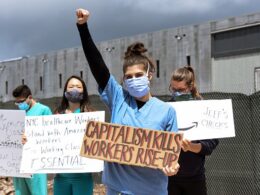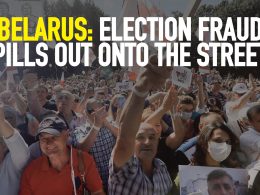By Harper Cleves
Think pieces, memes, and strangers offering fake alibis: these are just some of the mediums in which both adoration and fury were levelled at Luigi Mangione, the 26-year-old who has been charged with murder and terrorism for the killing of United Healthcare CEO Brian Thompson.
Mangione’s actions were motivated by a deeply personal anguish at having been failed by a for-profit healthcare system. Individually targeting CEOs isn’t a pathway to structural change. In fact, it is counterproductive. Not only will new money-grubbing capitalists line up to take their place, but the state has become more advanced at tracking and monitoring us all and increasing repression generally. However, the pain behind such an act is eminently understandable, as is the fact that it has struck a sympathetic chord with millions who have similarly suffered under the cruel private healthcare system.
“You show me a capitalist, I’ll show you a bloodsucker”
This quote from Malcolm X seems especially apt when considering the profiteering US healthcare system. Insurance companies make billions annually by denying coverage to people in need of often life-saving health care.
An estimated 100 million US Americans are burdened with healthcare debt. It is estimated that insurers deny between 10% to 20% of healthcare claims, and a survey found that one in five US Americans say they have been denied coverage in their lifetime.
By contrast, in 2023, United Healthcare made $31.6 billion in profits. Brian Thompson, as CEO, made $10.2 million annually, including salary, bonus, and stock options. This wealth comes directly from millions or working people being forced into unbearable debt and millions being denied essential healthcare, resulting in immeasurable tragedy.
While Luigi Mangione is being charged with murder and terrorism, healthcare magnates across the country are considered pillars of the community, despite the countless deaths and incalculable suffering they are responsible for. But as long as profits are being turned for the super-rich and corporations, this is acceptable under US capitalism.
Establishment misses the mark
The political establishment in the US has tried to mollify the celebrity status Luigi Mangione has been given, but to little effect, often revealing a disconnect between their own lofty positions and that of their base.
For instance, right-wing pundit Ben Shapiro posted a video on YouTube, “The EVIL Revolutionary Left Cheers Murder!” about Luigi Mangione. Usually skilled at connecting with the mood of his base, this time Shapiro found the comment section flooded with discord. The most liked comment under his video read :
“Rightwinger here, you are wrong ben, this man [Thompson] denied 35% of claims. One was my dead parents heart surgery we couldn’t afford. He opted to die instead of give us the debt,”
Such tragic tales, unfortunately, seem to be the rule rather than the exception.
Donald Trump, usually a weather vane for public opinion, remained suspiciously quiet on the topic of Brian Thompson’s death. His silence reveals an inherent fissure in his own movement: his interests as a member of the wealthy elite are much more closely aligned to Brian Thompson’s than those of his supporters who experience the sharp edge of privatised healthcare.
In fact, under a Trump presidency, millions are projected to lose access to subsidies that provide access to health insurance. Trump is promising to revoke the 2021 version of the Affordable Care Act, which expires shortly after he takes office, denying millions, including many in Southern Red states, access to healthcare.
Has Luigi made us class conscious?
As much as it is nice to think that the fanfare around Luigi Mangione has bridged the gap between left and right and forged a path forward for united class struggle against our oppressors, the truth is more complicated.
The fissures in US society run deep, stoked by decades of successive presidencies in which both political parties have pitted ordinary people against one another on the basis of gender, sexuality, race and nationality.
Even so, the class anger that has been revealed through the support for Luigi Mangione does expose the most fundamental divide in capitalist society: that between capitalist exploiters profiting from the misery of ordinary people and the working class, who toil and suffer under this exploitation, but who also make the world run.
The anger at the healthcare system reveals that this divide still has the potential to be further exposed. An organised left movement, which successfully links the fight for trans liberation, anti-racism, anti-imperialism and women’s rights with the fight for issues like public healthcare, has the power to do what Luigi Mangione by himself could not: unite working-class people in a struggle not just for free public healthcare for all, but against the capitalist system as a whole.












